If you have an underlying health condition which is known to weaken your immune system (e.g. HIV-positive), or if you are taking certain medications which cause immunosuppression or weakening of the immune system, or if you are pregnant, etc. you may be at increased risk of infection. If you have any concerns about your health, you are advised to consult with a medical care provider at the UT Student Health Center. Appointments may be made at (865) 974-3648 (see https://studenthealth.utk.edu for additional details). Alternatively, you may choose to discuss your concerns with your personal physician.
As a condition of authorization, personnel who work with animals, are required to be enrolled in an Occupational Health and Medical Surveillance Program related to their potential risks. The goal of an Occupational Health and Medical Surveillance Program is to prevent occupational injury and illness, and protect the vulnerable populations of students, employees, and research animals.
It is the policy of the University of Tennessee to prevent exposure to airborne hazards while on the job. A respiratory protection program is one means to provide protection when other controls are not available or are ineffective. The primary objective is to prevent harmful exposure to airborne contaminants. Where feasible, this shall be accomplished through engineering controls (i.e., enclosure or isolation, general or local ventilation, and substitution of less toxic materials). When effective engineering controls and/or administrative controls are not feasible, or while they are being instituted or evaluated, the use of appropriate respiratory protection will be required.
All employees required to wear a respirator must complete an OSHA Respirator Medical Evaluation Questionnaire before using a respirator. The respiratory protection programs are overseen by the Environmental, Health, and Safety Department (EHS) on the main campus and by the UTIA Safety Office on the Ag campus.
Individuals with compromised immune systems (either due to a medical condition or medications) are more susceptible to infection which may be associated with research materials or animals.
These potentially “immunocompromising” conditions include the following:
- Diabetes
- HIV infection
- Pregnancy
- Autoimmune diseases being treated with immunosuppressive drugs
- Splenectomy
- Primary immunodeficiency syndromes
- <2 years post-bone marrow transplant
- Graft versus host disease
- Leukemia, lymphoma, myeloma, congenital primary or complement deficiencies
- Corticosteroid therapy >20 mg per day prednisone or equivalent for 2 weeks or more
- Cancer chemotherapy (currently undergoing or <3 months after cancer chemotherapy)
- Immunosuppressive drugs for a transplant
- All persons being treated with TNF-inhibitor monoclonal antibodies
Other medical conditions are associated with higher consequences of exposure to hazardous materials, including:
- Heart conditions (e.g., valve disease, heart failure)
- Iron-overload conditions (e.g., hemochromatosis)
- Chronic liver disease (e.g., cirrhosis, hepatitis, fatty liver disease)
- Hemoglobinopathies (e.g., sickle cell disease, beta thalassemia)
- Gastrointestinal conditions (or medications used to treat these)
- Eczema or other skin diseases which may present with open lesions
Post-Exposure Prophylaxis and Medical Monitoring
 Plans to address how a biological exposure incident will be addressed should be prepared by the laboratory and provided to the Biosafety Office for review prior to working with these agents.
Plans to address how a biological exposure incident will be addressed should be prepared by the laboratory and provided to the Biosafety Office for review prior to working with these agents.
This must include identifications of any post-exposure prophylaxis options and/or medical monitoring plans for those who may have been exposed to the agents.